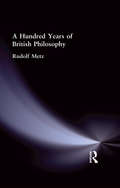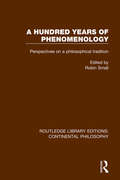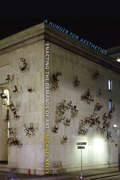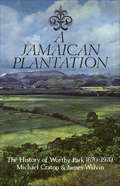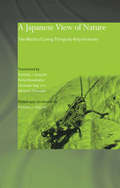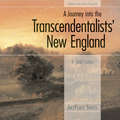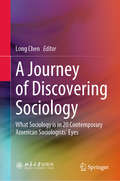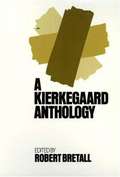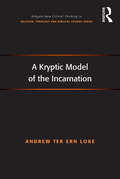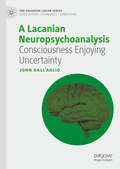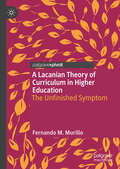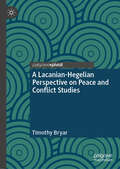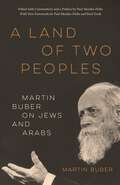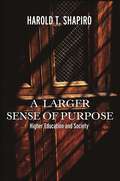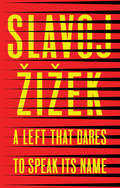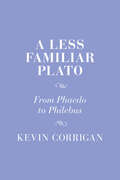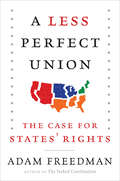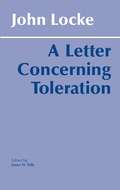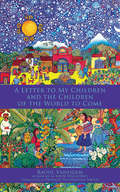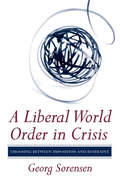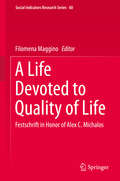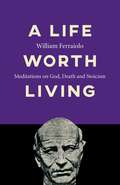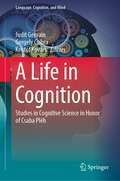- Table View
- List View
A Hundred Years of British Philosophy
by Metz, RudolfFirst published in 2002. Routledge is an imprint of Taylor & Francis, an informa company.
A Hundred Years of Phenomenology: Perspectives on a Philosophical Tradition (Routledge Library Editions: Continental Philosophy #5)
by Robin SmallThis title was first published in 2001. This collection of new essays on phenomenological themes reviews aspects of the philosophical movement which began with the publication in 1900-01 of Edmund Husserl's path-breaking Logical Investigations. A broad survey of phenomenology is particularly timely given that this philosophical movement is reaching a hundred years of its existence. The thirteen contributions represent a wide range of approaches and interests within the phenomenological framework. Some present approaches to Husserl, while others explore aspects of the fundamental texts of phenomenology and provide critical discussions of later thinkers such as Heidegger, Sartre, and Derrida whose relation to Husserl receives particular attention. The final section relates phenomenology to other disciplines and to broader issues in social thought and cultural studies. This book will enable students and professional philosophers alike to explore the various strands of this widely influential school of thought.
A Hunger for Aesthetics: Enacting the Demands of Art (Columbia Themes in Philosophy, Social Criticism, and the Arts)
by Michael KellyFor decades, aesthetics has been subjected to a variety of critiques, often concerning its treatment of beauty or the autonomy of art. Collectively, these complaints have generated an anti-aesthetic stance prevalent in the contemporary art world. Yet if we examine the motivations for these critiques, Michael Kelly argues, we find theorists and artists hungering for a new kind of aesthetics, one better calibrated to contemporary art and its moral and political demands.Following an analysis of the work of Stanley Cavell, Arthur Danto, Umberto Eco, Susan Sontag, and other philosophers of the 1960s who made aesthetics more responsive to contemporary art, Kelly considers Sontag's aesthetics in greater detail. In On Photography (1977), she argues that a photograph of a person who is suffering only aestheticizes the suffering for the viewer's pleasure, yet she insists in Regarding the Pain of Others (2003) that such a photograph can have a sustainable moral-political effect precisely because of its aesthetics. Kelly considers this dramatic change to be symptomatic of a cultural shift in our understanding of aesthetics, ethics, and politics. He discusses these issues in connection with Gerhard Richter's and Doris Salcedo's art, chosen because it is often identified with the anti-aesthetic, even though it is clearly aesthetic. Focusing first on Richter's Baader-Meinhof series, Kelly concludes with Salcedo's enactments of suffering caused by social injustice. Throughout A Hunger for Aesthetics, he reveals the place of critique in contemporary art, which, if we understand aesthetics as critique, confirms that it is integral to art. Meeting the demand for aesthetics voiced by many who participate in art, Kelly advocates for a critical aesthetics that confirms the power of art.
A Jamaican Plantation: The History of Worthy Park 1670-1970
by James Walvin Michael CratonWorthy Park has archives covering much of its three-hundred year history. Using these records, the authors have written the first complete history of a West Indian sugar estate. However, this is not just the story of a single Jamaican plantation and its people over three hundred years; the study reveals, in microcosm, the social and economic development of the area.
A Japanese View of Nature: The World of Living Things by Kinji Imanishi (Japan Anthropology Workshop Series)
by Kinji ImanishiAlthough Seibutsu no Sekai (The World of Living Things), the seminal 1941 work of Kinji Imanishi, had an enormous impact in Japan, both on scholars and on the general public, very little is known about it in the English-speaking world. This book makes the complete text available in English for the first time and provides an extensive introduction and notes to set the work in context. Imanishi's work, based on a very wide knowledge of science and the natural world, puts forward a distinctive view of nature and how it should be studied. Imanishi's work is particularly important as a background to ecology, primatology and human social evolution theory in Japan. Imanishi's views on these subjects are extremely interesting because he formulated an approach to viewing nature which challenged the usual international ideas of the time, and which foreshadow approaches that have currency today.
A Journey In Ladakh: Encounters with Buddhism
by Andrew HarveyAn enlightening memoir about one man testing his mind and body while traveling to one of nature’s most spiritual places to explore Buddhist beliefs.Now considered a classic among readers interested in Tibetan Buddhism and pilgrimages of the spirit of all kinds, A Journey in Ladakh is Andrew Harvey's spiritual travelogue of his arduous journey to one of the most remote parts of the world—the highest, least populated region in India, cut off by snow for six months each year. Buddhists have meditated in the mountains of Ladakh since three centuries before Christ, and it is there that the purest form of Tibetan Buddhism is still practiced today.“An exceptional book, one whose magic is compounded by a singular blending of the wondrous and the commonplace, the sacred and the hilarious.” —Washington Post Book World“The spiritual journey is connected at every point by the geographical . . . He is made poignantly aware of the vulnerability of Ladakh, in which an ancient, peaceful culture, dominated by the great monasteries, is threatened by the encroaching Westernization of the world.” —New York Times Book Review“Even the most blemished readers will feel that they could improve their spirituality without really trying if they spent more time in Ladakh.” —Award–winning author Martin Amis
A Journey Into the Transcendentalists' New England
by R. Todd FeltonThis lavishly illustrated volume examines the major figures of the Transcendentalist movement and explores the places that inspired them. Beginning with Transcendentalism's birth in Boston and Cambridge, the book charts the development of a movement that revolutionized American ideas about the artistic, spiritual, and natural worlds. At the same time, it creates a vivid sense of New England in the nineteenth century, from its idyllic countryside and sleepy towns to its bustling ports and burgeoning cities. The book is divided geographically into chapters, each focusing on a town or village famous for its relationship to one or more of the Transcendentalists.
A Journey of Discovering Sociology: What Sociology is in 20 Contemporary American Sociologists’ Eyes
by Long ChenThis book gathers the author’s interviews with twenty leading sociologists from various fields at nine different prestigious universities in the USA, including their viewpoints, anecdotes and experiences in the world of sociology. Each chapter presents an interview with one sociologist, covering their views on contemporary sociology, their early university experiences, teaching experiences, experiences with publishing, and their reflections on life as a sociologist.Through the dialogues, readers can learn about sociology as well as sociologists’ lives in a unique and insightful way – just as the author did – and embark on a journey of discovering sociology. The book helps readers find their own answers to the two main questions explored: “What is sociology?” and “What is a sociologist’s life like?”
A Kierkegaard Anthology
by Søren Kierkegaard Robert BretallThis anthology covers the whole of Kierkegaard's literary career. The selections range from the terse epigrams of the Journal through the famous "Diary of the Seducer" and the "Banquet" scene, in which Søren Kierkegaard reveals his great lyric and dramatic gifts, on to the philosophical and psychological works of his maturity. These are climaxed by the beautiful and moving religious discourses which accompany them; finally, there is the biting satire of his Attack upon "Christendom. " This is emphatically not a collection of "snippets," but the cream of Kierkegaard, each selection interesting and intelligible in itself, and all ranking among his most important work. They are so arranged as to convey an idea of his remarkable intellectual development.
A Kryptic Model of the Incarnation (Routledge New Critical Thinking in Religion, Theology and Biblical Studies)
by Andrew Ter LokeThe Incarnation, traditionally understood as the metaphysical union between true divinity and true humanity in the one person of Jesus Christ, is one of the central doctrines for Christians over the centuries. Nevertheless, many scholars have objected that the Scriptural account of the Incarnation is incoherent. Being divine seems to entail being omniscient, omnipotent and omnipresent, but the New Testament portrays Jesus as having human properties such as being apparently limited in knowledge, power, and presence. It seems logically impossible that any single individual could possess such mutually exclusive sets of properties, and this leads to scepticism concerning the occurrence of the Incarnation in history. A Kryptic Model of the Incarnation aims to provide a critical reflection of various attempts to answer these challenges and to offer a compelling response integrating aspects from analytic philosophy of religion, systematic theology, and historical-critical studies. Loke develops a new Kryptic model of the Incarnation, drawing from the Greek word Krypsis meaning ’hiding’, and proposing that in a certain sense Christ’s supernatural properties were concealed during the Incarnation.
A Lacanian Neuropsychoanalysis: Consciousness Enjoying Uncertainty (The Palgrave Lacan Series)
by John Dall’AglioThis book brings together Lacanian psychoanalysis, neuropsychoanalytic work by Mark Solms and Ariane Bazan, Jaak Panksepp’s affective neuroscience, Karl Friston’s free energy principle, Adrian Johnston’s transcendental materialist philosophy, and Darian Leader’s critique of jouissance in Lacanian theory. In doing so, it articulates a philosophical and scientific basis for Lacanian neuropsychoanalysis. A Lacanian perspective on Solms’s recent neuropsychoanalytic developments in affective consciousness and predictive coding furnishes an immanent critique that advances both Lacanian psychoanalysis and neuropsychoanalysis. Dall’Aglio develops novel propositions for conceptualizing the Lacanian real, symbolic, and imaginary registers in the brain, treating affect systems like signifiers, viewing jouissance as surplus prediction error, and conceiving the brain as structurally antagonistic. It presents fresh theoretical and clinical insights in a manner that will be accessible to the interdisciplinary fields it draws upon. It will appeal to those working in neuropsychoanalysis, clinical psychology, neuroscience, psychoanalysis, and critical theory.
A Lacanian Theory of Curriculum in Higher Education: The Unfinished Symptom
by Fernando M. MurilloThis volume presents a distinctively Lacanian psychoanalytic approach to the theorizing, understanding, and critique of curriculum in higher education. In this work, the author presents the main theories of curriculum in the current discourse, develops a notion of critique, and applies it to existing global guidelines for curriculum reform. Relying on the architectonic of the subject as developed across the work of Jacques Lacan—expressed in the registers of the Symbolic, the Imaginary, and the Real—the author provides a new approach to understanding curriculum in terms of the psychic dynamics that explain its workings.
A Lacanian-Hegelian Perspective on Peace and Conflict Studies (Rethinking Peace and Conflict Studies)
by Timothy BryarThis book takes a ground-breaking approach to peace theory and practice at a time of multiplying global crises. It draws on the Lacanian-Hegelian dialectical materialism to rethink the way we think peace, conflict and violence as amongst multiple, overlapping crises including climate change, contemporary conflict, the threat of nuclear war, pandemics, the rise of far-right racism and growing class divisions. Such an approach may seem surprising. While Lacanian-Hegelian scholars have provided analyses of contemporary conflicts including Russia&’s war on Ukraine and Israel&’s war against Hamas, in doing so they have also made pointedly critiqued the theory and practice of peace. Rather than simply defend peace theory and practice, the book uses these critiques as the basis for rethinking peace and conflict. Therefore, the book occupies a unique position by being the first to apply Lacanian-Hegelian dialectical materialism to peace and conflict theory and practice broadlyIn doing so, it provides scholars, students and practitioners with new concepts and tools to rethink peace theory and practice – and to engage with politics in an age fraught with crises.
A Land of Two Peoples: Martin Buber on Jews and Arabs
by Martin BuberA new edition of Martin Buber’s many writings on Arab-Jewish relations in Palestine, with updated forewords by two preeminent Palestinian and Jewish scholars. The theologian and philosopher Martin Buber (1878–1965) was committed to radical socioeconomic reconstruction in pursuit of international peace. His voluminous writings on Arab-Jewish relations in Palestine interweave his religious and philosophical teachings with his politics, each essential to Buber’s vision of democratic and religious life. A Land of Two Peoples collects the letters, talks, and essays in which Buber advocated for a binationalism that reconciled Arabs and Jews as a solution to the conflict in the Middle East. As relevant today as when it was first published nearly fifty years ago, this edition of A Land of Two Peoples includes two forewords from the preeminent Jewish and Palestinian scholars Paul Mendes-Flohr and Raef Zreik.
A Larger Sense of Purpose: Higher Education and Society (The William G. Bowen Series #41)
by Harold T. ShapiroUniversities were once largely insular institutions whose purview extended no further than the campus gates. Not anymore. Today's universities have evolved into multifaceted organizations with complex connections to government, business, and the community. This thought-provoking book by Harold Shapiro, former president of both Princeton University and the University of Michigan, and Chairman of the National Bioethics Advisory Commission under President Bill Clinton, explores the role the modern university should play as an ethical force and societal steward. Based on the 2003 Clark Kerr lectures, A Larger Sense of Purpose draws from Shapiro's twenty-five years of experience leading major research universities and takes up key topics of debate in higher education. What are the nature and objectives of a liberal education? How should universities address the increasing commercialization not only of intercollegiate sports but of education and research? What are the university's responsibilities for the moral education of students? The book begins with an expanded history of the modern research institution followed by essays on ethics, the academic curriculum, the differences between private and public higher education, the future of intellectual property rights, and the changing relationship between the nation's universities and the for-profit sector. Shapiro calls for universities to be more accountable morally as well as academically. He urges scientists not only to educate others about the potential and limitations of science but also to acknowledge the public's distress over the challenges presented by the very success of the scientific enterprise. He advocates for a more intimate connection between professional training and the liberal arts--in the hope that future doctors, lawyers, and business executives will be educated in ethics and the social sciences as well as they are in anatomy, torts, and leveraged buyouts. Candid, timely, and provocative, A Larger Sense of Purpose demands the attention of not only those in academics but of anyone who shares an interest in the soul of education.
A Left that Dares to Speak Its Name: 34 Untimely Interventions
by Slavoj ZizekWith irrepressible humor, Slavoj i ek dissects our current political and social climate, discussing everything from Jordan Peterson and sex “unicorns” to Greta Thunberg and Chairman Mao. Taking aim at his enemies on the Left, Right, and Center, he argues that contemporary society can only be properly understood from a communist standpoint. Why communism? The greater the triumph of global capitalism, the more its dangerous antagonisms multiply: climate collapse, the digital manipulation of our lives, the explosion in refugee numbers – all need a radical solution. That solution is a Left that dares to speak its name, to get its hands dirty in the real world of contemporary politics, not to sling its insults from the sidelines or to fight a culture war that is merely a fig leaf covering its political and economic failures. As the crises caused by contemporary capitalism accumulate at an alarming rate, the Left finds itself in crisis too, beset with competing ideologies and prone to populism, racism, and conspiracy theories. A Left that Dares to Speak Its Name is i ek’s attempt to elucidate the major political issues of the day from a truly radical Leftist position. The first three parts explore the global political situation and the final part focuses on contemporary Western culture, as i ek directs his polemic to topics such as wellness, Wikileaks, and the rights of sexbots. This wide-ranging collection of essays provides the perfect insight into the ideas of one of the most influential radical thinkers of our time.
A Less Familiar Plato: From Phaedo to Philebus (Cambridge Studies in Religion and Platonism)
by Kevin CorriganIn this book, Kevin Corrigan sheds light on aspects of Plato's thought that are less familiar to contemporary readers. He reveals a Plato who believes in Forms but is not essentialist, who develops a scientific view of perception in the middle and late dialogues, and who offers positive models of art and science. Corrigan shows how Plato articulates a broader view of intelligible reality in which embodiment is affirmative and the mind-soul-body continuum has an eidetic structure, and where even failure and the imperfect are included. He also demonstrates that Plato developed an ideal, yet finely layered view of love that provided a practical guide throughout antiquity; and that the dialogues and unwritten teachings can be understood in a mutually open-ended, non-antagonistic way. Corrigan's book provides a guide to Plato in an unexpected key and poses important questions regarding imagination, divine inspiration, and Forms and the Good, among other topics.
A Less Perfect Union: The Case for States' Rights
by Adam Freedman“How Washington elites have effectively staged a coup against the sovereign states, usurping powers that were never intended for the central government.” —Mark R. Levin, #1 New York Times-bestselling authorIn A Less Perfect Union, Adam Freedman provides an illuminating history of states’ rights, from the Constitutional Convention through the Civil War and the New Deal to today. He reveals how hard the Founders fought to keep power in the hands of the states, the surprising role of states’ rights as a weapon against slavery, and the federal government’s eventual abandonment of all constitutional limitations on the scope of its power. Surveying the latest developments in Congress and the state capitals, he finds a growing sympathy for states’ rights on both sides of the aisle, as the federal government usurps more and more control.But Freedman goes further, boldly arguing that a return to states’ rights is the only way to check the tyranny of federal overreach, take power out of the hands of the special interests and crony capitalists in Washington, and realize the Founders’ vision of freedom. With concrete policy proposals, A Less Perfect Union lays out an achievable vision of a nation in which states are free to address the health, safety, and economic well-being of their citizens without federal coercion and crippling red tape.As states’ rights issues continue to drive the national conversation, A Less Perfect Union is essential reading for anyone frustrated by the federal government’s daily infringement of the quintessentially American right of local self-government.
A Letter Concerning Toleration
by John Locke James H. TullyJohn Locke's subtle and influential defense of religious toleration as argued in his seminal Letter Concerning Toleration (1685) appears in this edition as introduced by one of our most distinguished political theorists and historians of political thought.
A Letter in the Scroll: Understanding Our Jewish Identity and Exploring the Legacy of the World's Oldest Religion
by Rabbi Jonathan SacksFor too long, Jews have defined themselves in light of the bad things that have happened to them. And it is true that, many times in the course of history, they have been nearly decimated: when the First and Second Temples were destroyed, when the Jews were expelled from Spain, when Hitler proposed his Final Solution. Astoundingly, the Jewish people have survived catastrophe after catastrophe and remained a thriving and vibrant community. The question Rabbi Jonathan Sacks asks is, quite simply: How? How, in the face of such adversity, has Judaism remained and flourished, making a mark on human history out of all proportion to its numbers? Written originally as a wedding gift to his son and daughter-in-law, A Letter in the Scroll is Rabbi Sacks's personal answer to that question, a testimony to the enduring strength of his religion. Tracing the revolutionary series of philosophical and theological ideas that Judaism created -- from covenant to sabbath to formal education -- and showing us how they remain compellingly relevant in our time, Sacks portrays Jewish identity as an honor as well as a duty. The Ba'al Shem Tov, an eighteenth-century rabbi and founder of the Hasidic movement, famously noted that the Jewish people are like a living Torah scroll, and every individual Jew is a letter within it. If a single letter is damaged or missing or incorrectly drawn, a Torah scroll is considered invalid. So too, in Judaism, each individual is considered a crucial part of the people, without whom the entire religion would suffer. Rabbi Sacks uses this metaphor to make a passionate argument in favor of affiliation and practice in our secular times, and invites us to engage in our dynamic and inclusive tradition. Never has a book more eloquently expressed the joys of being a Jew. This is the story of one man's hope for the future -- a future in which the next generation, his children and ours, will happily embrace the beauty of the world's oldest religion.
A Letter to My Children and the Children of the World to Come
by Donald Nicholson-Smith John Holloway Raoul VaneigemSome 35 years after the May 1968 “events,” this short book poses the question of what kind of world we are going to leave to our children. A Letter to My Children and the Children of the World to Come provides a clear-eyed survey of the critical predicament into which the capitalist system has now plunged the world. At the same time, in true dialectical fashion, Vaneigem discerns all the signs of “a new burgeoning of life forces among the younger generations, a new drive to reinstate true human values, to proceed with the clandestine construction of a living society beneath the barbarity of the present and the ruins of the Old World.”
A Liberal World Order in Crisis: Choosing between Imposition and Restraint
by Georg SørensenThe collapse of the bipolar international system near the end of the twentieth century changed political liberalism from a regional system with aspirations of universality to global ideological dominance as the basic vision of how international life should be organized. Yet in the last two decades liberal democracies have not been able to create an effective and legitimate liberal world order. In A Liberal World Order in Crisis, Georg Sorensen suggests that this is connected to major tensions between two strains of liberalism: a "liberalism of imposition" affirms the universal validity of liberal values and is ready to use any means to secure the worldwide expansion of liberal principles. A "liberalism of restraint" emphasizes nonintervention, moderation, and respect for others. This book is the first comprehensive discussion of how tensions in liberalism create problems for the establishment of a liberal world order. The book is also the first skeptical liberal statement to appear since the era of liberal optimism—based in anticipation of the end of history—in the 1990s. Sorensen identifies major competing analyses of world order and explains why their focus on balance-of-power competition, civilizational conflict, international terrorism, and fragile states is insufficient.
A Life Devoted to Quality of Life: Festschrift in Honor of Alex C. Michalos (Social Indicators Research Series #60)
by Filomena MagginoThis Festschrift is published in honor of Alex C. Michalos, a great scholar and inspiration to many upcoming and famous academics and practitioners. The Festschrift celebrates his lifelong, outstanding scientific and cultural contribution to Quality of Life Research. It contains contributions written by the most prestigious and renowned scholars in the field of social indicators research and quality of life studies. Taken together, the contributions from scholars around the world reflect Michalos' stance that even though there may be differences in individual scientific positions, the language in the field of quality of life has no limits and boundaries.
A Life Worth Living: Meditations on God, Death and Stoicism
by William FerraioloStoicism offers rationally grounded, proven psychological techniques for the gradual development of consistent self-mastery, and emotional detachment from those elements of the human condition that tend to cause the most pervasive and unsettling forms of fear, anxiety, and avoidable disquiet. In the essays in A Life Worth Living, William Ferraiolo examines what it means to incorporate Stoicism into 21st century life, adapting classical Stoic philosophy for the modern day. 'William Ferraiolo&’s new book represents an essential contribution to all who struggle with living a meaningful life.' Eldon Taylor, Ph.D, New York Times bestselling author of Choices and Illusions
A Life in Cognition: Studies in Cognitive Science in Honor of Csaba Pléh (Language, Cognition, and Mind #11)
by Judit Gervain Gergely Csibra Kristóf KovácsThis edited book offers a broad selection of interdisciplinary studies within cognitive science. The book illustrates and documents how cognitive science offers a unifying framework for the interaction of fields of study focusing on the human mind from linguistics and philosophy to psychology and the history of science. A selection of renowned contributors provides authoritative historical, theoretical and empirical perspectives on more than six decades of research with a special focus on the progress of cognitive science in Central Europe. Readers encounter a bird’s eye view of geographical and linguistic diversity brought about by the cognitive revolution, as it is reflected in the writings of leading authors, many of whom are former students and collaborators of Csaba Pléh, a key figure of the cognitive turn in Central Europe, to whom this book is dedicated. The book appeals to students and researchers looking for the ways various approaches to the mind and the brain intersect.
